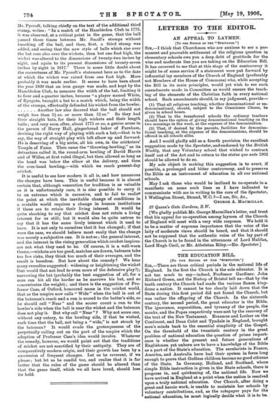LETTERS TO THE EDITOR.
AN APPEAL TO LAYMEN.
[To THE EDITOR OF THE " SPECTATOR."1 Six,—I think that Churchmen who are anxious to see a per. manent and peaceable settlement of the religious question in
elementary schools owe you a deep debt of gratitude for the wise and moderate line you are taking on the Education Bill.
It has occurred to me that at this stage of the controversy it might be of some service if a statement were put forward by influential lay members of the Church of England (preferably not Members of the House of Commons) who, while accepting the Bill in its main principles, would yet wish to see such amendments made in Committee as would ensure the teach- ing of the elements of the Christian faith in every national school. Such amendments should, in my judgment, provide— (1) That all religious teaching, whether denominational or nn. denominational, should, subject to the Conscience Clause, be given in school hours.
(2) That in the transferred schools the ordinary teachers should have the option of giving denominational teaching on the two mornings in the week, at the expense of the denomination.
(3) That, if desired by the parents, facilities for denomina- tional teaching, at the expense of the denominations, should be offered in all schools alike.
And I would gladly add as a fourth provision the excellent
suggestion made by the Spectator, and endorsed by the British Weekly, that any Voluntary school that wished to contract itself out of the Act and to return to the status quo ante 1902 should be allowed to do so.
My sole object in making this suggestion is to avert, if possible, a prolonged and bitter controversy, and to preserve the Bible as an instrument of education in all our national schools.
May I ask those who would be inclined to co-operate in a manifesto on some such lines as I have indicated to communicate with me in writing to the care of the Spectator, 1 Wellington Street, Strand, W.C. P—I am, Sir, &c., GEORGE A. MACMILLAN.
27 Queen's Gate Gardens, S. W.
[We gladly publish Mr. George Macmillan's letter, and trust that his appeal for co-operation among laymen of the Church of England will meet with a very wide response. We hold it to be a matter of supreme importance that the voice of the laity of moderate views should be heard, and that it should not be supposed that the authentic voice of the lay part of the Church is to be found in the utterances of Lord Halifax, Lord Hugh Cecil, or Mr. Athelatan Riley.—En. Spectator.]










































 Previous page
Previous page